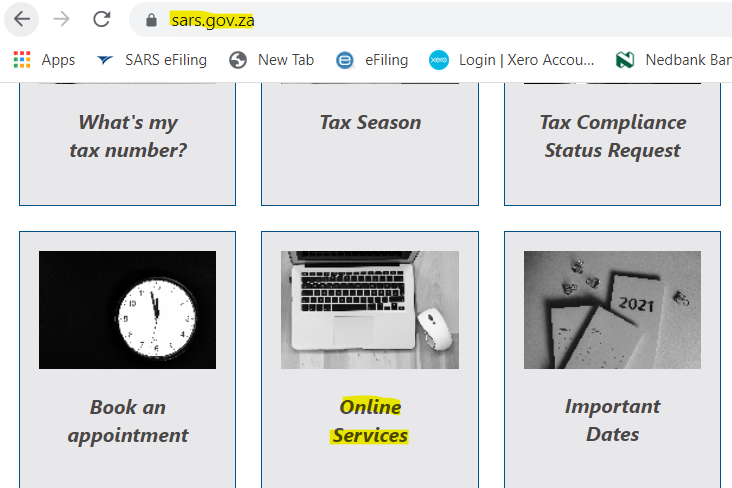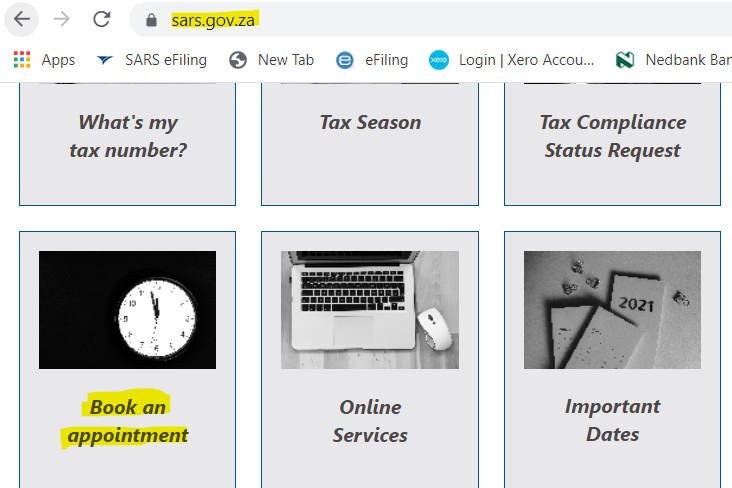 When your loved one passes away, you need to take time to process the loss. Unfortunately, life goes on and part of it is the tax administration burden of the deceased pre- and post-death tax. It is important for family members to know that SARS is involved in the process of finalizing an estate. The Executor of the estate can only finalize the matter when SARS is satisfied that all the tax affairs of the deceased, pre- and post-death, are up to date.
When your loved one passes away, you need to take time to process the loss. Unfortunately, life goes on and part of it is the tax administration burden of the deceased pre- and post-death tax. It is important for family members to know that SARS is involved in the process of finalizing an estate. The Executor of the estate can only finalize the matter when SARS is satisfied that all the tax affairs of the deceased, pre- and post-death, are up to date.
The following is a short summary of the steps that need to be taken:
Step 1 – Estate coding at SARS:
New Estate Cases must be reported to SARS on their online service.

To report a new Estate Case to SARS, it is important that you submit the correct supporting documentation. The following is a list of these documents:
- A photo of the Executor holding his/her proof of identity. It is important that their face and proof of identity are clearly visible in the same picture.
- Copy of the death notice of the deceased (J294) issued by the Master’s Office or the death certificate.
- Copy of Acceptance of trust as Executor (Form J190) or Copy of the Letter of Executorship (J238).
- Copy of the undertaking and acceptance of the master’s directions (Form J155) or Copy of the Letter of Authority (J170) (in cases where the estate is less than R250 000).
- Copy of the Inventory (Form J243).
- Copy of the last will and testament.
- Certified copy of the ID of both the deceased person and the Executor.
- The name, physical address, email address and telephone number of the Executor and his or her agent.
- In the case of an agent, a Power of attorney and certified ID copy of the appointed person.
- Copy of signed final Liquidation and Distribution accounts when they become available (if applicable).
- The Estate Duty Return (REV267 form).
Once all is in order, SARS will code the deceased as an Estate case.
Step 2 – Appoint an Executor:
There must always be an Executor on an Estate Case. To appoint an Executor at SARS you need to make an online SARS appointment.

The following documents must be uploaded for the Executor appointment at SARS:
- Copy of the death notice of the deceased issued by the Master’s Office or the death certificate.
- Copy of the Letter of Executorship.
- Certified copy of the ID of both the deceased person and the Executor.
- Photo of the Executor where he/she holds their ID.
- Proof of address in the name of the Executor, not older than 3 months.
- Bank statement in the name of the deceased, not older than 3 months (Estate Late bank account).
- Power of Attorney in the case where a Tax Practitioner will do the appointment, and a Certified Copy of the appointed Tax Practitioner.
Step 3 – Obtain tax reference number for the Estate:
As soon as Step 1 and 2 is finalized the Estate must be registered on e-File for post-death.
- The registration is done on e-File under Maintain SARS registered details.
- The most important document needed is the Death certificate as confirmation of date of death.
- The Estate will receive its own Post-death tax number.
Step 4 – Pre-Death – Completing and submitting of tax returns:
- Request relevant certificates, etc.
- Complete and submit all / any outstanding tax returns on SARS e-File.
Step 5 – Post-Death – Completing and submitting of tax returns:
On receipt of the L&D and Income and expenditure account from the Executor the following is done:
- Request relevant certificates to complete the post-death tax return.
- Complete and submit the post-death tax return on e-File.
Step 6 – Notify Executor of tax compliance:
When the pre-death and post-death returns are all up to date the following is sent to the Executor as confirmation that the individual (pre- and post-death – Estate case) is tax complaint:
- Tax assessment(s) for the submitted pre-death tax returns.
- Tax assessment(s) for the submitted post-death tax returns.
- Pre- and Post-death statements of account.
- Tax compliance status.
If you have any enquiries, please do not hesitate to contact Louise Bester at lbester@fhbc.co.za or Adri Britz at abritz@fhbc.co.za

